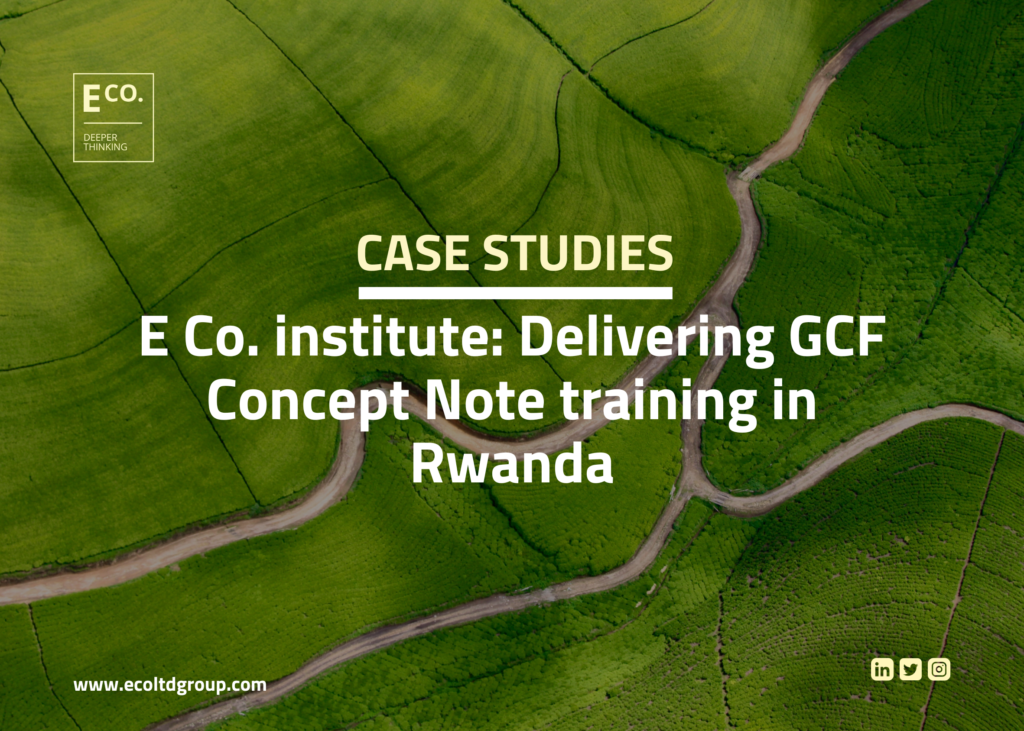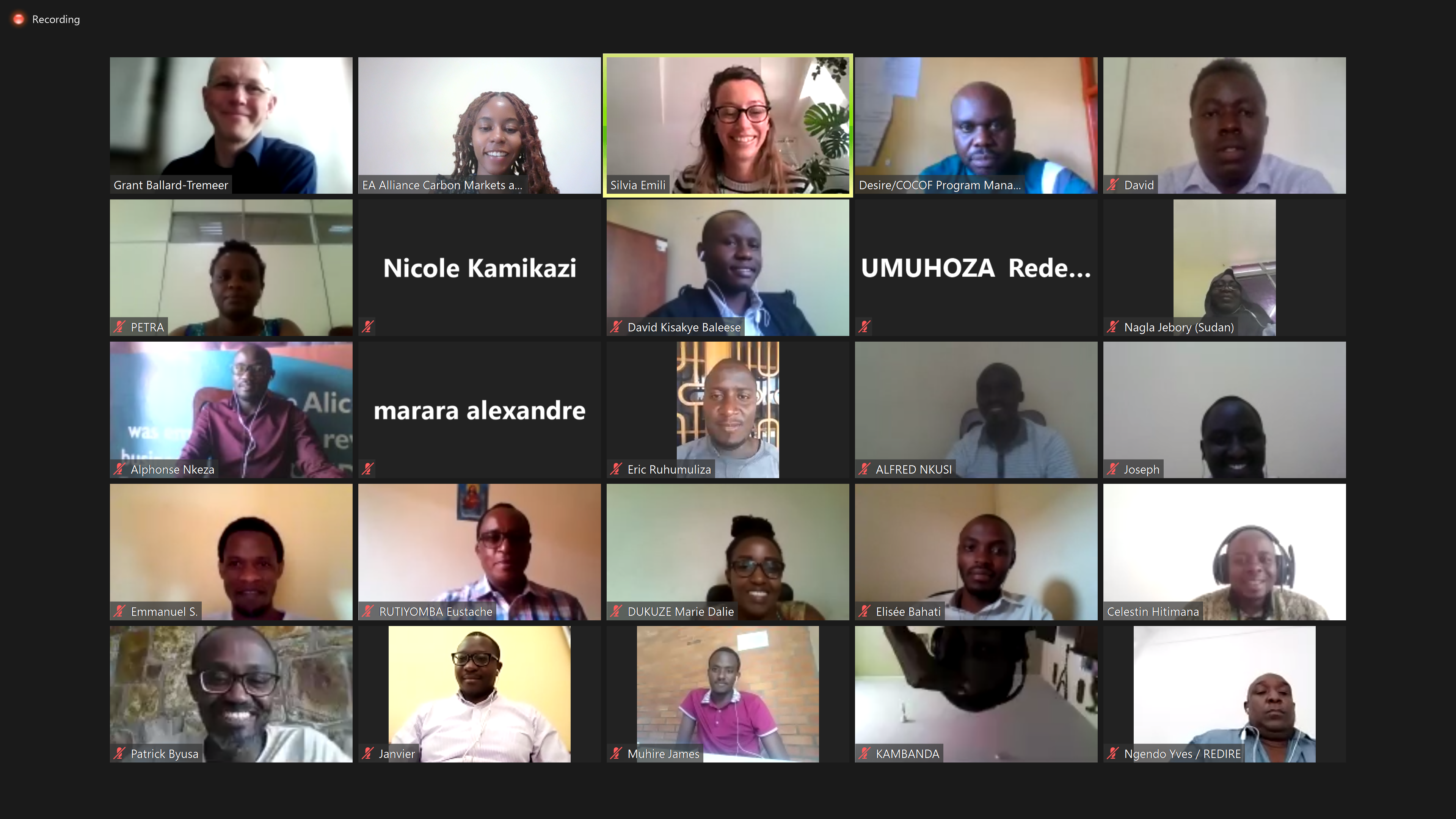E Co. institute: Delivering GCF Concept Note training in Rwanda

What is the Green Climate Fund looking for when it comes to designing project concept notes? Over the last six weeks, E Co. has delivered GCF Concept Note training to participants in Rwanda with the aim of answering this question, including local government, NGOs, and private sector actors. The training was delivered for the German Development Agency (GIZ), whose Global Carbon Markets programme is extending its support to Rwanda through the East African Alliance on Carbon Markets and Climate Finance. E Co. worked to coordinate the training with the Global Green Growth Institute (GGGI) and the National Designated Authority (NDA), Rwanda Environment Management Authority (REMA).
CEO Grant Ballard-Tremeer and Senior consultant Silvia Emili led the training sessions, breaking down ways to approach each section in the concept note. The objective of this training was to build greater understanding of exactly what is required when developing GCF concept notes, from the inclusion of relevant climate science to the justification for GCF resources. In turn, this would promote green growth by helping unlock investments and designing climate projects with social, environmental, and economic benefits for the people of Rwanda.
Virtual training sessions – structure, topics and assessments
Due to COVID restrictions, the training was delivered in a series of online sessions rather than in person. It covered several topics, including the GCF investment criteria; barrier analysis; understanding project budgets and co-financing; gender considerations; and the climate baseline and rationale.
Approximately 50 participants attended the training, having been selected after submitting a short project idea note (PIN). PINs received tailored feedback, with 5 of the most promising ideas chosen to be developed further using the GCF concept note format. As the training progressed, participants were invited to resubmit their PINs and concept notes to reflect the information and knowledge gained. Our trainers re-assessed the submissions, with each one moving closer towards a fundable project idea.
Group workshops
In our training, E Co. typically uses a ‘learning by doing’ approach. That is, participants take part in smaller group sessions to discuss topics and complete tasks based on the session topic. We see this as a useful tool to help test the knowledge learned during the training by applying it – in this case, to GCF concept note development. Moreover, it encourages greater participation and engagement, leading to a more proactive approach.
Attendees were asked to work in smaller groups on topics that often hinder concept note formulation. These can include the climate rationale – the term used to describe the scientific basis for the project idea – and the paradigm shift – proponents of a project that will lead to longer-term sectoral change driven rather than a one-off project without longevity.
To achieve this, participants were divided into groups based on their interests (such as food and water security, communities, biodiversity). Groups were asked to analyse past GCF concept notes to identify evidence that they satisfied the necessary requirements for that specific topic. For example, when discussing the GCF Investment Framework, each group was tasked with finding evidence that their specific concept note included the relevant criteria (impact potential, paradigm shift potential, sustainable development potential, needs of the recipient, country ownership, and efficiency and effectiveness). This exercise allowed participants to see how real concept notes have been designed previously, and what needs to be included for it to be successful.
Other key focus areas
Senior consultant Imelda Phadtare delivered an engaging presentation on climate vulnerability and risks. This focused on adaptation and the hazards, exposure, sensitivity, and adaptive capacity associated with climate extremes in target regions. This provided detailed insights for participants to better understand exactly what must be included in the GCF concept notes when designing adaptation (or cross-cutting) projects.
Our training also discussed the intricacies of financing, an essential and important element of any concept note and an area that stakeholders often find challenging to get right. In particular, our trainers highlighted the importance of breaking project components down by cost, justifying exactly why the GCF is the preferred funding source, methods of calculating co-financing, and how project designers must incorporate long-term sustainability into their concept notes. An additional session was added to introduce participants to other potential sources of funding that may be more appropriate for the size of the projects they are seeking to design. Knowledge of GCF concept note process provides a valuable basis upon which applications for other funders can be built.
What happens next
Upon completion of our training courses, we provide all participants with the opportunity to join our E Co. institute alumni group. This provides ongoing peer-to-peer support and networking with others that have trained with E Co. and seek to further their knowledge and experience in project development.
We are eager to support those seeking to access climate finance. We have a long and successful history in designing projects, from the concept note stage to full GCF funding proposals. Our training aims to distill this experience, allowing participants to gain the understanding necessary to design GCF concept notes themselves.
To find out more about our training offerings, visit our E Co. institute page here.
Looking for insight into climate finance? Look no further
Let’s accelerate progress together: Get in touch with our climate finance consultants to discuss a project you’re working on. Email us at: amy@ecoltdgroup.com or find us at the following:
Twitter: @ecoltdnews
LinkedIn: E Co.
Instagram: @ecoltdnews
